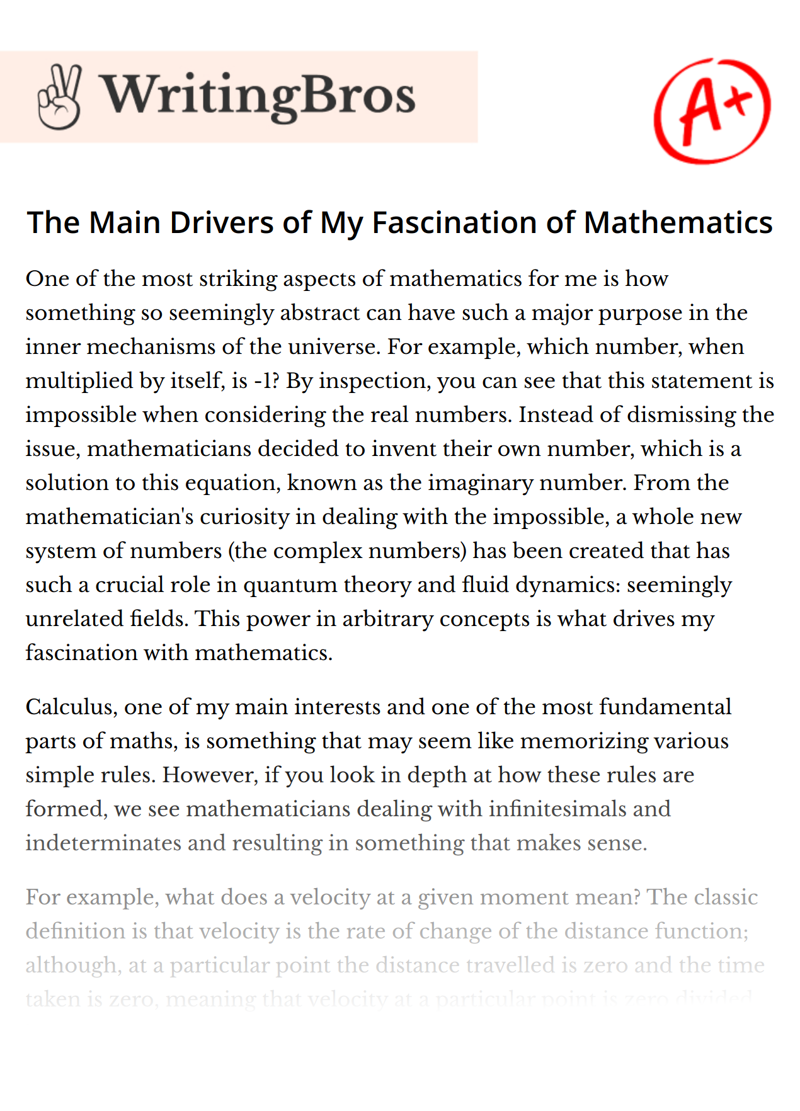The Main Drivers of My Fascination of Mathematics

One of the most striking aspects of mathematics for me is how something so seemingly abstract can have such a major purpose in the inner mechanisms of the universe. For example, which number, when multiplied by itself, is -1? By inspection, you can see that this statement is impossible when considering the real numbers. Instead of dismissing the issue, mathematicians decided to invent their own number, which is a solution to this equation, known as the imaginary number. From the mathematician's curiosity in dealing with the impossible, a whole new system of numbers (the complex numbers) has been created that has such a crucial role in quantum theory and fluid dynamics: seemingly unrelated fields. This power in arbitrary concepts is what drives my fascination with mathematics.
Calculus, one of my main interests and one of the most fundamental parts of maths, is something that may seem like memorizing various simple rules. However, if you look in depth at how these rules are formed, we see mathematicians dealing with infinitesimals and indeterminates and resulting in something that makes sense.
For example, what does a velocity at a given moment mean? The classic definition is that velocity is the rate of change of the distance function; although, at a particular point the distance travelled is zero and the time taken is zero, meaning that velocity at a particular point is zero divided by zero, an indeterminate form. These kind of fascinating questions sparked my interest, compelling me to read and watch around the subject and seek to learn more about the history of math, and other interesting math concepts. 'Fermat's Last Theorem' by Simon Singh, and 'The Music of the Primes' by Marcus Du Sautoy, provided me with a brief understanding of the attempt by 20th Century mathematicians to delve into the fundamentals of mathematics. I was struck by how all of our vast mathematical knowledge can be derived from a few simple axioms, and that Kurt Gödel showed that there will always be true statements that can never be proved. I also read 'Professor Stewart's Incredible Numbers' which among other things taught me the maths behind solving the Rubik's cube, one of my hobbies, including the surprising fact that it can always be solved in 20 moves, even though it has over 43 quintillion permutations.
From Year 7, I entered the UKMT Math Challenge and was awarded a Gold Certificate in 4 of those years. In Years 9 and 12, I took part in the Kangaroo round; in Year 11, I received a merit in the Maclaurin Olympiad and 'Best in School' for the intermediate challenge. In Years 9 and 12, I was invited to represent my school in the UKMT Team Math Challenge in the junior and senior challenges. I relish these sorts of competitions as well as harder math problems found in STEP and MAT papers as they encourage me to apply logical problem solving to unfamiliar concepts. I am a Math Prefect and, each week, help struggling A-level students with their math at school. This has helped me develop my abilities in communicating difficult mathematical ideas in ways that others can understand. I also tutor KS2, GCSE and A level Math students outside school, giving me valuable experience in teaching.
In addition, I am working towards my Grade 7 piano, having achieved distinctions in most of the other 6 grades. I passed my DofE Bronze Award in Year 10 and am currently working towards my Gold Award. In the last few years, I have been trekking in the Alps, each time covering over 200km in a fortnight; this has built up my resilience and determination, giving me the skills to pursue DofE gold. In July 2018, I helped at a science summer camp for a week, working with children aged 7-12, supervising science experiments.
I am a hard-working and enthusiastic student, and I hope to fulfill my curiosity and passion for mathematics by studying it at university. I believe math is the most beautiful and engaging subject to pursue.
Cite this Essay
To export a reference to this article please select a referencing style below

